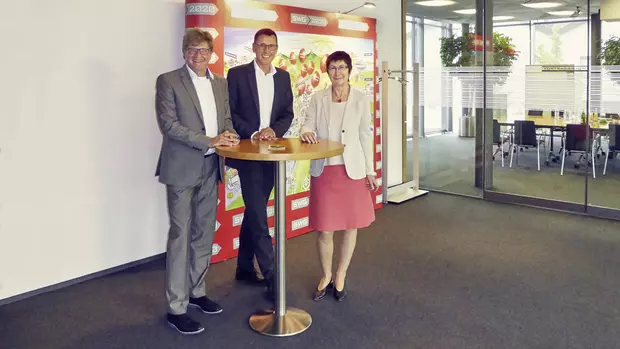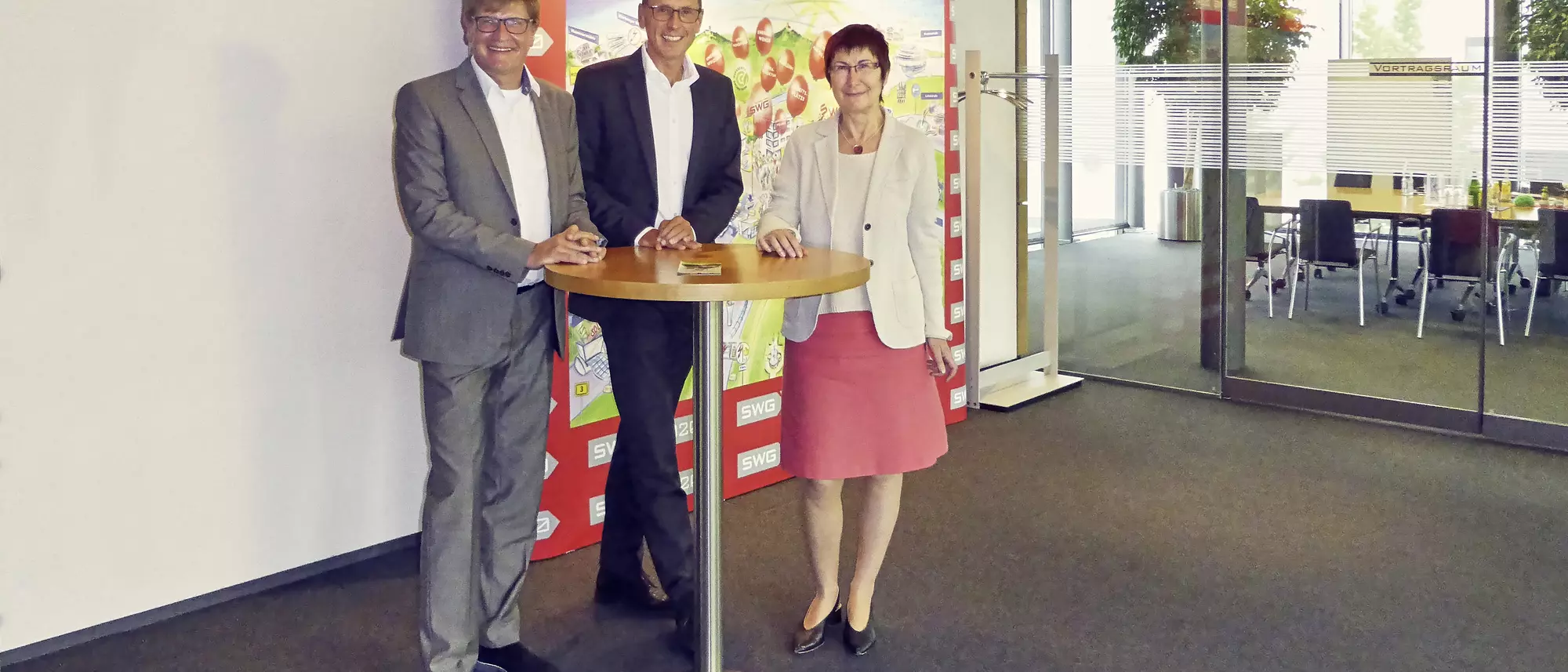
The Supervisory Board of Stadtwerke Gießen (SWG) has reappointed Matthias Funk and Jens Schmidt as members of the municipal company's Management Board. There are many good reasons in favour of extending their contracts for a further five years.
At Stadtwerke Gießen (SWG), the signs point to continuity - at least as far as the two most senior managers are concerned: the Supervisory Board confirmed Matthias Funk as Chief Technical Officer and Jens Schmidt as Chief Commercial Officer. The decision to extend Jens Schmidt's contract for a further five years was made back in December 2018. At the last meeting on 22 May 2019, the Board reappointed Matthias Funk to the position. His contract also runs for another five years. "We dealt intensively with this issue in the Supervisory Board's Personnel Committee and quickly came to a consensus on both appointments after in-depth discussions," explains Astrid Eibelshäuser, Chairwoman of the SWG Supervisory Board.
In fact, the reappointment of the management duo is no coincidence. As a representative of the city of Giessen, which owns 100 per cent of SWG, Astrid Eibelshäuser provides good reasons: "On the one hand, we are naturally interested in stability. Security and continuity play an extremely important role, especially for a utility company. Secondly - and this is just as important - we were impressed by the work of the two board members." The fact is: SWG can look back on successful years. This is not only reflected in the good business figures. In addition to the balance sheets, it is above all the stringent corporate strategy that speaks in favour of the two old and new Management Board members. "What we find particularly positive is that SWG is already tackling the challenges of tomorrow today, looking for sensible, sustainable alternatives and has already done a lot in this direction. Of course, this is also thanks to the two gentlemen, who persistently stand up for pioneering solutions, even if they are not immediately obvious to everyone," continues Astrid Eibelshäuser.
Breaking new ground
A particularly good example of SWG's goal-orientated, level-headed approach is its handling of the issue of the transport transition. Unlike many of its competitors, who put charging points into operation to great media effect, SWG first sounded out the situation before developing its own idea and launching a well thought-out, truly practical, comprehensive concept. "The e-revolution really does cover all areas - from the vehicle to the charging option in the garage at home to green electricity production on your own roof and its storage," says a delighted Astrid Eibelshäuser.
SWG is also not taking the usual route when it comes to sustainable local transport. The two decision-makers did not consider putting a single electric bus into operation as a beacon, as is the case elsewhere, and otherwise continuing to operate diesel buses. Instead, SWG had the exhaust emissions of the diesel and natural gas buses operated by its local transport subsidiary MIT.BUS analysed extensively in real-life operation. The results of this study, which was carried out according to strict scientific criteria, proved what the experts had suspected for years: The use of fossil natural gas alone leads to an enormous improvement in air quality in the city. If, as is already the case in Giessen, the entire bus fleet is refuelled with bio natural gas,CO2 emissions are also reduced to practically zero. "Tackling exactly this kind of problem speaks in favour of SWG and therefore in favour of its two board members," says Astrid Eibelshäuser.
The energy transition on site
It goes without saying that Stadtwerke Gießen is applying the same meticulousness and innovative strength to its core business area of energy supply. Here, too, they do not follow trends or vague gut feelings. Every idea has to prove itself in practical tests. To this end, SWG, especially Matthias Funk in the technical area, utilises the good relationships it has maintained for many years with the Technical University of Central Hesse (THM). This close cooperation has resulted, for example, in a method of treating the actually problematic rust ash from the TREA and thus rendering it harmless. The process, known as carbonatisation, combines several advantages: It transforms material that was originally environmentally critical and costly to dispose of into an unproblematic building material. In addition, carbonatisation removesCO2 from the flue gas, which is then no longer released into the atmosphere.
Further projects dealing with clean and sustainable energy production, storage and distribution have long since been initiated. For example, SWG and THM are working on utilising sewage sludge, which can no longer be spread on fields, as a fuel for heat generation in the future. "SWG is already looking for municipal partners to supply them with the necessary quantities of sewage sludge," explains Astrid Eibelshäuser. In the state-funded KommunE project, THM has been commissioned by SWG to analyse which scenarios will affect the forthcoming conversion and expansion of the energy grids and how. This provides decision-makers with reliable figures that they can use for concrete planning. The subject of another, also state-funded study, which THM and SWG are tackling together, is the sensible interaction of different storage systems for the electricity and heat supply of modern residential neighbourhoods - in other words, sector coupling. "When it comes to the energy transition and efficient solutions for it, we have a real expert on board at SWG in Matthias Funk," says Astrid Eibelshäuser. "He has proven many times that he knows when the time is right to try out a new technology."
Focus on the region
SWG and its subsidiary Mittelhessen Netz (MIT.N) are once again proving that it pays to develop alternatives to the usual approach in what is currently the largest energy project - the switch from L-gas to H-gas. "MIT.N is the only company in Germany to use regional partners for this largest infrastructure project since the introduction of natural gas and thus keep the technical project management in-house," explains Astrid Eibelshäuser. And here, too, the calculation worked out perfectly. Because the project management in this constellation inevitably has to lie with MIT.N, the experts in Lahnstrasse find out much more precisely and much earlier if problems arise and can take appropriate countermeasures. "Quite apart from that, of course, the added value remains largely in the region," adds the Chairwoman of the Supervisory Board.
Matthias Funk and Jens Schmidt are also driving digitalisation forward at SWG. Many things are being developed here, others are already in operation, such as the ultra-modern interconnected grid control centre, which enables numerous automations. But customers can also already utilise one or two digital innovations. For example, at the instigation of Jens Schmidt, SWG is one of the first energy suppliers in Germany to communicate with its customers via WhatsApp. "From the city's point of view, the Wi-Fi set up and operated by SWG in the city centre, which Jens Schmidt also championed, is particularly worth mentioning. This service, which is free of charge for users, massively enhances the city of Giessen," adds Astrid Eibelshäuser. SWG is also involved in the Giessen app. The SWG Bonus World is a separate municipal utility section where customers can find attractive savings offers, for example from the swimming pools. "Of course, there is still a lot to do when it comes to digitalisation. But we are confident that SWG is well positioned to integrate the expected developments into its business model in a meaningful way," says the Chairwoman of the Supervisory Board, describing the situation. She sees Jens Schmidt as the perfect person for this complex transformation: "He knows that you also have to pursue supposedly crazy ideas in order to come up with truly innovative solutions."
Astrid Eibelshäuser and her colleagues on the Supervisory Board have sent out an important signal with the reappointment of Matthias Funk and Jens Schmidt. They are convinced that the two Management Board members will make Stadtwerke Giessen fit for the upcoming upheavals in the energy market. This also includes successively adapting the tried-and-tested business model to the new conditions.
"We feel honoured and confirmed in our work," explains Jens Schmidt. "Of course, we will do everything we can to continue the success story of Stadtwerke Gießen." And his colleague Matthias Funk adds: "We would also like to take this opportunity to thank the Supervisory Board once again for the trust they have placed in us. We take it as an incentive for the next five years."
About the people
Jens Schmidt swapped his job as Managing Director of a grid company in the RWE Group for a position on the Executive Board of Stadtwerke Gießen in December 2014. "It appealed to me to look at the big picture instead of just one detail at a time," says the industrial engineering graduate, explaining his move to the Lahn. The 52-year-old also enjoys taking on challenges - such as those brought about by the upheaval on the energy market. To balance things out, he enjoys cycling and a lot of sport.
As a graduate engineer in energy and heating technology, Matthias Funk worked at SWG for 27 years, first as a project engineer and then as head of the heat supply department, before being appointed to the Technical Directorate in May 2015. In these roles, he made a significant contribution to the development and expansion of climate-friendly electricity and heat generation in Giessen and found his true calling. That's why he likes to say goodbye to colleagues and employees with the phrase " ... and good efficiency". When he's not travelling on his e-bike or doing other sports, the 57-year-old likes to spend his free time with his wife and three children.

